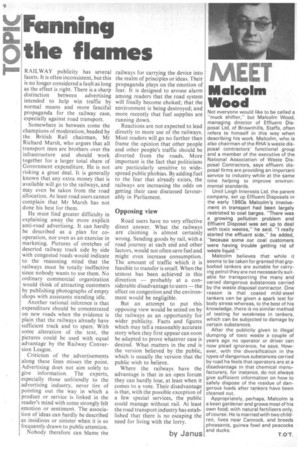Malcolm Wood
Page 80

If you've noticed an error in this article please click here to report it so we can fix it.
Not everyone would like to be called a "muck shifter," but Malcolm Wood, managing director of Effluent Dis posal Ltd, of Brownhills, Staffs, often refers to himself in this way when describing his work. Malcolm, who is also chairman of the RHA's waste disposal contractors' functional group and a member of the executive of the National Association of Waste Disposal Contractors, says effluent dis posal firms are providing an important service to industry while at the same time helping to improve environmental standards.
Until Leigh Interests Ltd, the parent company, set up Effluent Disposals in the early 1960s Malcolm's involvement in transport had been largely restricted to coal barges. "There was a growing pollution problem and Effluent Disposal was set up to deal with toxic wastes," he said. "I really started the effluent side," he added, "because some our coal customers were having trouble getting rid of waste liquid."
Malcolm believes that while it seems to be taken for granted that grp bodied tankers are suitable for carry ing petrol they are not necessarily suitable for transporting the many and varied dangerous substances carried by the waste disposal contractor. One reason is that coated mild-steel tankers can be given a spark test for body stress whereas, to the best of his knowledge, there is no similar method of testing for weakness in tankers, which can be subjected to damage by certain substances.
After the publicity given to illegal dumping of toxic waste a couple of years ago no operator or driver can now plead ignorance, he says. However, with the diversification in the types of dangerous substances carried by road he feels that operators are at a disadvantage in that chemical Manu facturers, for instance, do not always give sufficient information on how to safely dispose of the residue of dangerous loads after tankers have been cleaned out.
Appropriately, perhaps, Malcolm is a keen gardener and grows most of his own food; with natural fertilizers only, of course. He is married with two children, lives near Cannock, and breeds pheasants, guinea fowl and peacocks and ducks.
T.O'T.




























































































































































